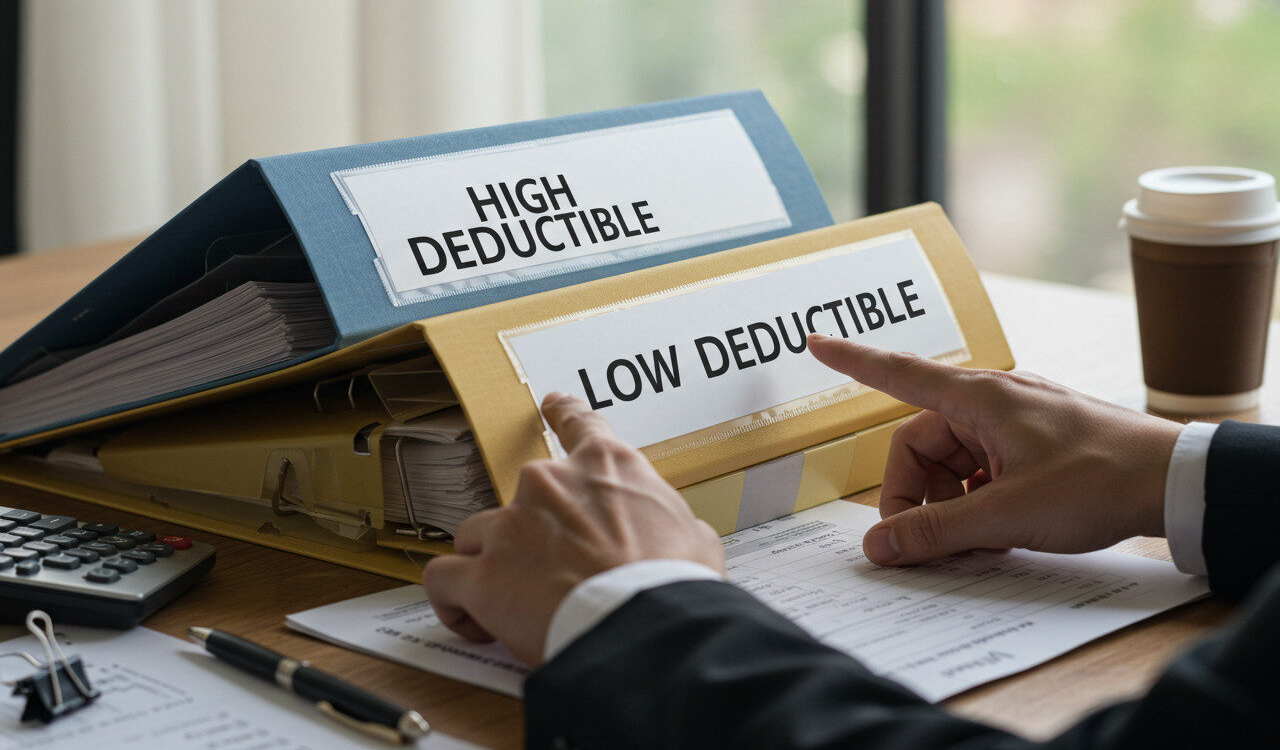High Deductible vs Low Deductible Insurance
Choosing between a high deductible and a low deductible is one of the most important parts of picking insurance. This decision affects your monthly payments and how much you pay when you file a claim. Knowing deductibles helps you balance your budget, health needs, and risk tolerance.
Highlights
- An insurance deductible is the money you must pay before your coverage starts.
- High deductible plans often have lower monthly premiums but higher costs at claim time.
- Low deductible plans usually mean higher premiums but lower out-of-pocket expenses when you need care.
- Choosing the right plan depends on your finances, health, and comfort with risk.
- Knowing insurance terms like copay, coinsurance, and out-of-pocket maximum prevents unexpected expenses.
Insurance Deductibles
A deductible is the set amount you must pay before your insurance helps cover costs. Health plans may have individual or family deductibles, while auto and homeowners insurance apply deductibles per claim.
Deductibles apply differently depending on the type of policy:
- Health insurance: Deductibles reset each plan year.
- Auto insurance: Deductibles apply per accident or damage claim.
- Homeowners insurance: Deductibles apply per event and may differ for special risks like floods or earthquakes.
Insurance Terms
- Deductible: Amount you pay before coverage begins.
- Copay: Fixed fee for services like doctor visits or prescriptions, often before meeting the deductible.
- Coinsurance: Percentage you pay after meeting the deductible, until reaching your out-of-pocket maximum.
Knowing these terms makes it easier to plan for expenses and avoid surprises.
Deductible vs Copay
- Deductible: Paid first before insurance contributes.
- Copay: Paid each time for certain services, regardless of deductible status.
Copays usually do not count toward your deductible but do count toward your annual out-of-pocket maximum.
How Coinsurance Impacts Costs
Once your deductible is met, coinsurance kicks in. For example, with an 80/20 plan, the insurer covers 80% of costs while you pay 20% until your out-of-pocket maximum is reached. After that, the insurer pays 100% of covered expenses for the rest of the plan year.
High vs Low Deductibles
| Feature | High Deductible Plan | Low Deductible Plan |
|---|---|---|
| Monthly Premium | Lower | Higher |
| Out-of-Pocket at Claim | Higher | Lower |
- When high deductibles make sense: Best for healthy people who rarely visit doctors and want to save on monthly costs.
- When low deductibles make sense: Ideal for those with ongoing medical needs, frequent doctor visits, or families who prefer predictable costs.
Guide to Choosing the Right Deductible
1. Assess your risk tolerance and finances
Ask yourself if you could cover the full deductible in an emergency. If savings are limited, a low deductible provides more financial security.
2. Compare premium costs and potential savings
Look at quotes with different deductibles. A higher deductible may save on premiums but could lead to higher unexpected costs if you need care.
3. Consider your claim history
- Health insurance: Do you or your family need regular visits, prescriptions, or treatments?
- Auto/home insurance: How often do you file claims?
Frequent claims usually make a low deductible the smarter choice.
4. Review policy limits
Always check the out-of-pocket maximum, which caps your total yearly costs. This is an important safeguard whether you choose high or low deductibles.
Conclusion
A high deductible plan reduces monthly premiums but increases out-of-pocket costs during claims. A low deductible plan has higher premiums but provides financial relief when you need care. The right choice depends on your savings, health needs, and willingness to take on risk.
Frequently Asked Questions
Does a higher deductible mean lower premiums?
Yes. Insurers lower premiums when you agree to pay more out of pocket before coverage starts.
Do all insurance policies have deductibles?
No. Some liability or preventive health policies do not include deductibles.
What happens if my claim is below my deductible?
You must pay the full cost yourself, since the deductible has not been met.
Are deductibles the same for all types of insurance?
No. Health insurance deductibles reset each year, while auto and home insurance apply per claim.
Which deductible type is best for families?
Families with frequent medical needs often benefit from a low deductible plan, as it reduces surprise costs during the year.
Updated by Albert Fang
Source Citation References:
+ Inspo
Mirian, I., Kabir, M. J., Barati, O., Keshavarz, K., & Bastani, P. (2020). Deductibles in health insurance, beneficial or detrimental: A review article. Iranian Journal of Public Health, 49(5), 851.

